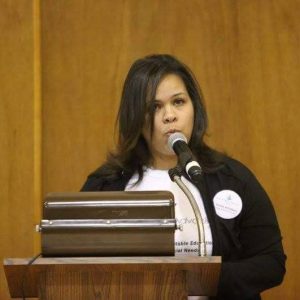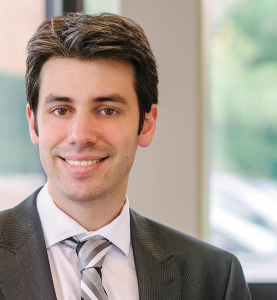Adults on the autism spectrum often have difficulty finding employment.
Entrepreneurs and advocates are working to fix that by pairing companies with a pool of candidates.
Adults on the autism spectrum often have difficulty finding employment.
Entrepreneurs and advocates are working to fix that by pairing companies with a pool of candidates.
I am writing a magazine article on the difficulties New Jersey families or patients face in getting appropriate health care (medical, dental, mental health) for people with ASD.
If this has been a big issue for you and you want to be interviewed, please let me know.
My email is tinakelleywriter@gmail.com.
Thank you!
To read Paul S. Aronsohn's 2018 Annual Ombudsman Report, click below:
Tom Toronto is the President of Bergen County's United Way.

Sam Fogelgaren
What are the main projects of the Bergen County United Way in general, and specifically impacting people with disabilities?
Tom Toronto
At United Way, we’re focused on affordable housing, both development and building. We focus on a cross section of affordable housing, and we have a particular passion for supportive housing for people with disabilities. We build both in Bergen and outside of Bergen - we just opened a 12-unit apartment in New Brunswick, and this week we have a groundbreaking for more housing in Wyckoff. Later this month we have more single family units opening up.
We made the decision a little more than a decade ago that we’d change our business model from redistributing donor dollars to other non-profits to focusing on one major challenge, which was affordable housing. There is always a lack of affordable housing, and in all types of needs assessments, affordable housing is the number one most visible commonality. The lack of affordable housing cascades into other issues, such as financial security. The only way to meaningfully address the issue was to actually increase the supply of homes people could afford. So we became a developer. We started to work with individual municipalities. Supportive housing became a big need since there were a lack of group homes. At one point, there were an estimated 8,000 or so people on the waiting list for people desiring community placement. That’s how it started. With the persistent need for housing, it gave us the opportunity to be somewhat innovative for people with Autism, which is what we did in Ramsey. From a design perspective as well as quality of life, over time we’ve seen happiness with the tenants.
Sam
What is the environment for affordable housing for people with disabilities? What are the major challenges and opportunities?
Tom
I think the awareness of the issue and the level of understanding is increasing. We’re finding that more municipalities, as a result of the construction and housing we’ve been doing, they’re much more open to supportive housing as a way to satisfy their affordable housing requirements. There’s a border acceptance and understanding among elected officials. The attractiveness of the projects, success in terms of community acceptance. The word has spread, and we’re looked upon as a partner for municipalities.
One of the main challenges that remains is funding. Building in New Jersey, particularly in north Jersey is expensive. Land is expensive, because we’re competing for all the pieces that make a project successful, such as amenities, proximity to transportation - if you’re located near a transit village, that drives up the price of the land. Then there’s the cost of building. Construction costs, permitting, approvals, engineering, architecture, legal, environmental remediation, there’s a lot that goes into these projects, and the costs are quite high.
Sam
What steps do you take, in any step of the development process, to ensure people in BCUW residences have access to important resources, such as transportation?
Tom
We’re not service providers, we’re developers. However, we do take responsibility for quality of life. We build where transportation is already available, or can be provided through Access Link, Community Transport, or service providers. We understand that transportation is vital for living a connected life.
Sam
What are some of the biggest challenges to building more affordable housing?
Tom
The most significant challenge for us is the time it takes to get to completion - it’s significant. Funding channels have gotten tighter and tighter. We’ve considered traditional bank financing, since government subsidies have become harder to get. Conventional bank financing adds another layer of cost, however.
What we’re looking at now is mixing market rate housing and supportive housing. We have a mixed market rate housing project in Fort Lee that opened a few months ago. Because of financing challenges, mixing market rate and affordable housing helps. Programmatically, it helps with regards to diversifying, having different groups living together, which is a good thing. We want to do more of the market-affordable housing.
Sam
What is the future of affordable housing for people with disabilities in north Jersey?
Tom
I am optimistic about the future of affordable housing. Confidence among elected officials is high. We’re looking at a piece of property now, which would use borough funds to build a group home on town property. There’s a heightened awareness from local officials. In the past, they’ve been mystified about the concerns people have had about supportive housing. People have always had fears about it. But the way we see it, each project we build strengthens the argument for building this housing. So many communities can build housing - and many have. Another indication of success is that towns we’ve built with in the past have invited us back. The comfort level with these projects is increasing, and there are quite a few more projects in the pipeline.
-
Find out more about Bergen County's United Way at http://www.bergenunitedway.org/
Nicole Whitfield is the founder and Executive Director of the Special Parent Advocacy Group (SPAG).

Sam Fogelgaren
We first met in 2013, and SPAG has grown so much since then. Talk about why you started SPAG, and how it’s grown, and what you do.
Nicole Whitfield
I started SPAG in November of 2011 for the purposes of advocating for children with disabilities in the city of Trenton. The reason why my husband and I decided to start it was because of the hard time we had with our son Alex. We couldn’t get the services he was entitled to through Trenton Public Schools. From there, we’ve evolved into a well rounded organization, not just advocacy. We also have respite programs - we originally only contracted with the state to do after school programs - the first special needs after school program in Trenton. Then we grew throughout Mercer County, and now our respite programs are servicing many counties, such as Middlesex, Burlington, Passaic, Essex and Bergen. One of our programs services the entire state. We’re opening up an overnight respite home in Pemberton - since children are entitled to six nights of overnight respite per year. We started doing respite programs in 2014. From 2011 to 2014 we were mainly an advocacy group, without funding, of course. The funding didn’t come until we were doing programs.
Sam
You’re extremely involved and committed to your family. Can you talk about the role of family in your work?
Nicole
I have a birth son with special needs, but I’ve also adopted three special needs children through the foster care system. So in total, we have seven kids. It’s difficult work, but its rewarding work. We live it, we work it, we sleep it. Servicing people with special needs is just what we do. I couldn’t imagine my life without all this going on. It’s overwhelming, but incredibly rewarding. We’re doing a good thing, and we’re doing what god put us on a path to do. It’s a calling; you have to be meant for this type of work. And now some of the kids who started with us when we were younger are helping out at SPAG - some of them volunteering, some of them working, which is really gratifying to see.
Sam
What are the biggest challenges in terms of starting as well as sustaining a non-profit focused on disability services?
Nicole
The most difficult challenges revolve around employees: hiring and retaining people. Ensuring that they’re the right people and that they’re in it for the right reasons, that they have the heart for this work. Because you’re not gonna get rich off these jobs. When you’re a direct support professional, your heart has to be in it. It can’t just be a job. Weeding through people who aren’t in it for the right reasons is a big challenge. Additionally, the balance between advocacy and respite. Our advocacy work is not funded, but we don’t feel that we can abandon it, because those are the principles we are founded on.
Sam
How has your experience been with the fee-for-service switch?
Nicole
SPAG started as fee for service, so we have just tried to service as many kids as we have the capacity to hold. I do see that there’s an improvement in the FFS contract from when I started. And there’s far more kids getting services, and that dates to before Governor Murphy took office. Will it get even better? I hope so, because a lot of kids are still not receiving services. We were the only provider in Mercer County when we started. There are a lot more providers doing this kind of work now. So its definitely improving. But its also important to keep things in perspective. We’re looking at other states to expand, and its clear that New Jersey is one of the best places for these services. Other states don’t even have a respite plan, or the state doesn’t offer respite care. And I’m just talking about social and recreational programs - some states still use institutions. I know someone who moved to North Carolina recently, and she’s shocked because when it comes to services, there’s nothing. So New Jersey is definitely ahead of other states.
Sam
You service people who are bordering on age 21. What are some challenges you see in the transition experience?
Nicole
The biggest transition challenge from our perspective (as under 21 providers) is what to do about participants who age out. One reason why we decided to contract with DDD is that they can still get that continuum of care. When they age out, I can just contact their support coordinator and they continue to get care, as opposed to them getting kicked out. It’s a real challenge for providers who aren’t contracted with DDD. One of the biggest post 21 challenges is that there are not a lot of day program options. We need more providers doing that work. Especially programs that promote community inclusion.
Part of the issue is that the state doesn’t offer any funding for education advocacy. It’s a huge issue. Any organizations that get funded have been funded forever. And the type of advocacy they’re doing has moved away from one on one advocacy. There’s no funding for organizations to help parents get through the application processes, like DDD and PerformCare. We help a lot of parents and families who don’t understand the process get eligible for DDD. We don’t get funding for it, we do it because its right. It’s a challenge.
Sam
Any other information about SPAG people should know?
Nicole
We are doing a community inclusion program starting in the first week of July, in Bergen and Passaic Counties. We’re also opening a new office in Elmwood Park, as well as a respite program in Bergen and Passaic. We have a weekend and after school respite program, as well as a summer camp, for the last two weeks in August.
Additionally, we’re having a fundraiser on Tuesday, July 3, at Macaluso’s in Hawthorne, from 530-10. Anyone who is interested in buying tickets or donating can call 201-509-8961.
-
You can find more information about SPAG at their website, http://www.tspag.org
Andrew Meltzer is a Special Education Attorney with Sussan, Greenwald & Wesler.

Sam Fogelgaren
What can be done, both short long term, to make the web of programs and institutions that make up the post-transition disability experience easier to navigate?
Andrew Meltzer
There are a couple of different approaches. For one, there needs to be much more transition planning at the school district level to advise parents on what DDD and other agencies do, and what they can provide. Districts are charged under the law with doing transition planning. However, that doesn’t always happen as much as it should. We help families with transition planning in school districts. Additionally, its important to collaborate with school districts. DDD needs to get involved earlier in the process. There should be more communication, more events, more information about what they can provide. Furthermore, we need to hear more from key stakeholders. That includes the state legislature, Governor Murphy, and DHS (Department of Human Services). They need to listen to parents and individuals - about what their experiences and problems are, in order to streamline the process. They have their feet on the ground, and we need maximum participation from them.
One big victory borne from that process was the out-of-state residential program fight. Governor Christie tried to bring every individual in out-of-state residential placements back to New Jersey, which would have caused massive disruptions to families and lives. Families spoke with their legislatures, testified in committee meetings, and they reached a compromise. As a result, many people were able to stay in those out-of-state placements. They was that concerned citizens worked with their legislators. Elected officials are often eager to help, but they need to know what is going on. Those in the legal and political worlds and consumers themselves can form strong alliances.
Sam
What changes, whether they be legal, policy, or social and cultural changes like shifts popular attitude would you most like to see in the coming years and decades?
Andrew
In special education, we need to focus on what the Supreme Court said - that IEP’s need to be ‘appropriately ambitious.’ Following that ruling will help create change. It reinforces that disabilities are not burdensome - that people learn differently, and have unique abilities. With the right supports, that can make a huge difference. We also need more funding for special education. IDEA (Individuals with Disabilities Education Act) has not been fully funded in years. And this becomes a problem because school districts often use budgetary reasons to deny services. The law doesn’t care about budgets, but it becomes a big issue in practice.
School districts can do more. If a student has behaviors, realizing that there could be many reasons for those behaviors is important. Many schools have policies such as automatic disciplinary measures - which are harmful. Districts can look to see if there is an undiagnosed disability. The DOE (Department of Education) can go into these districts and oversee that. This is a key strategy to reducing the school to prison pipeline.
We also need better transition planning for the post 21 experience. The focus should be on the continuation of what special education calls for: ambitious programs that emphasize people’s abilities. To build on their independence and increase contribution to society, and maximize their contributions.
Another cause I’m very involved in is mental health reform. A lot of young people that suffer from mental illness don’t get treatment or even diagnoses. A lot of mental illness manifests between ages 18 and 24. And often times, services can’t be provided because people don’t know they are ill, and as a result they fall through the cracks. This is another cause that we need to look at seriously.
Sam
This quote is located on your web page: "My goal is to help special needs students attain the success in school and life they are capable of through my advocacy." I wanted to talk about that word, advocacy. What does advocacy mean to you, and what advice would you give to people who want to get involved disability advocacy, but don’t know how.
Andrew
To me, advocacy is the ability to reject the status quo, to stand up for what you believe in and not accept that things will always remain the same. Everyone advocates in different ways. It could be something as small as not getting the right amount of change in a purchase, or something as large as being discriminated against. Advocacy does not just extend to the individual; it goes further than that. People who lack the ability to speak for themselves, they have teams that work with them. There are legal routes with attorneys, there are special needs parent groups, advisory groups to government agencies.
Stand up for yourself and others, and push for things to be changed. There’s a lot that needs to be changed, and its up to people, elected officials, organizations - really everybody - to create something different.
New York Metro Abilities Expo
May 4-6, 2018
New Jersey Convention & Expo Center
Fri. 11am-5pm | Sat. 11am-5pm | Sun 11am-4pm
For more information, visit: https://www.abilities.com/newyork/.